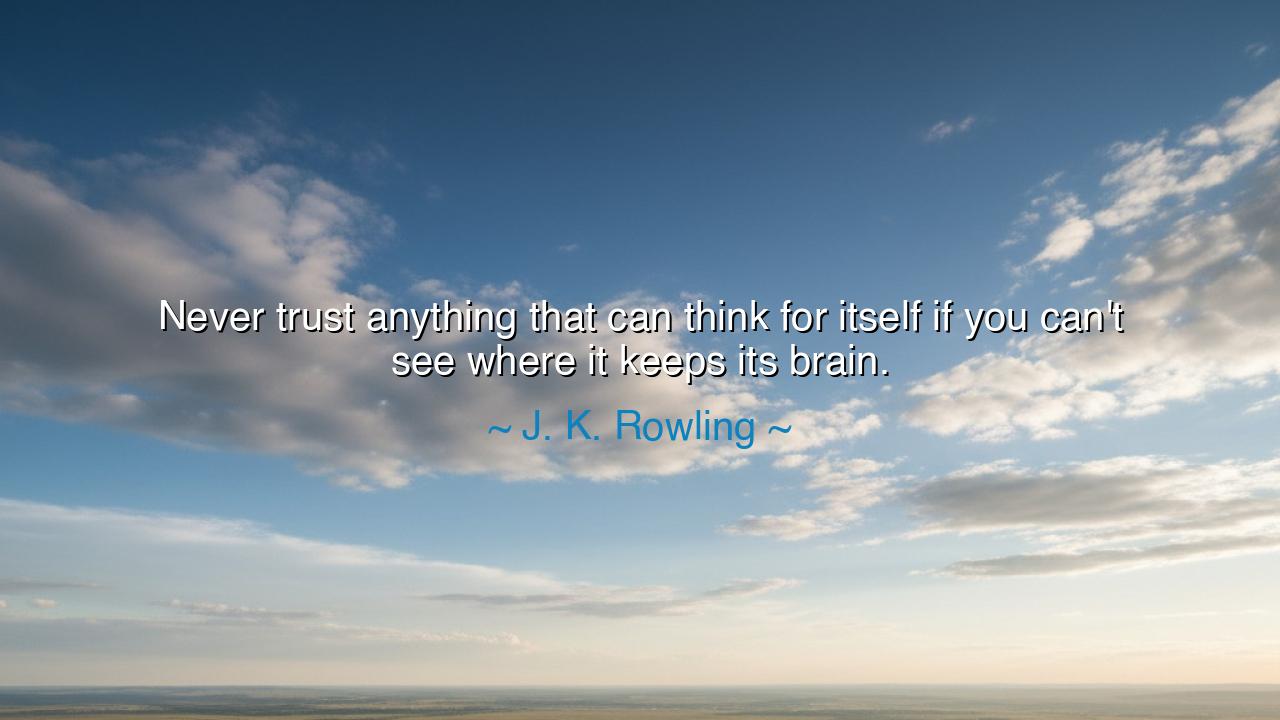
Never trust anything that can think for itself if you can't see
Never trust anything that can think for itself if you can't see where it keeps its brain.






Hear the words of J. K. Rowling, who clothed her wisdom in the garments of story, yet whose meaning reaches far beyond the page: “Never trust anything that can think for itself if you can’t see where it keeps its brain.” At first, these words may sound like the warning of a tale spun for children, but they are in truth the counsel of the ancients dressed in modern form. They remind us to guard against power that cannot be understood, and against voices that speak without revealing the source of their authority. For when the origin of thought is hidden, the heart is easily deceived.
The ancients taught much the same. In Greece, oracles would give prophecies in riddles, and kings who trusted them blindly often found themselves undone. For what is a word of counsel without knowing the mind that shaped it? To follow such guidance is like walking in the dark, led by a stranger whose face you cannot see. Rowling’s warning is the same: do not place your trust in what cannot be traced, nor in intelligence that hides its roots, for behind the mask may lie danger, corruption, or deceit.
History itself bears this lesson. Consider the rise of false prophets and manipulators throughout the ages. In Salem, whispers of witchcraft spread like fire, and people trusted accusations without examining their source. Fear itself became the voice that thought for the community, and because no one could “see the brain” of that fear—no one could trace it to reason—the result was tragedy, with innocents condemned. Thus we learn: to trust unexamined power or unseen thought is to risk ruin.
And think also of more recent times. Propaganda in the twentieth century became a weapon that thought for millions. Radios and posters declared truths, yet the minds behind them—the architects of control—were hidden from the people. Citizens were told what to believe, what to fear, and what to hate, without seeing clearly who shaped those messages. And so nations marched into wars, led not by reason but by shadows. This is precisely Rowling’s warning: never trust what thinks for you if you cannot see where its brain is kept.
The meaning also runs into our own lives. In an age of machines, algorithms, and voices that speak through screens, we are daily confronted with “things that think.” Yet often we do not know where they keep their “brains”—who programmed them, what motives guided their creation, what truths or falsehoods they might weave into our lives. To follow blindly is to surrender one’s own mind; to question is to remain free.
The lesson is this: always seek the source. Before you give trust, ask: who speaks here? Where does this thought arise? What motive guides it? If you cannot trace the root, hold back your loyalty. Let your judgment be like a sword that cuts through illusions, a lamp that reveals the hidden chamber where the brain must dwell. For wisdom is not in believing quickly, but in discerning carefully.
So, children of tomorrow, carry Rowling’s warning as both shield and guide. Do not fear intelligence, but demand clarity. Do not reject what is new, but question what is hidden. Do not hand over your trust to voices without a mind you can examine. For the world is full of words and forces that will think for you if you let them. Guard your reason, guard your heart, and never forget: the truest strength lies in knowing not only what is spoken, but who speaks and from where. This is the path of wisdom, and the safeguard of your freedom.






AAdministratorAdministrator
Welcome, honored guests. Please leave a comment, we will respond soon